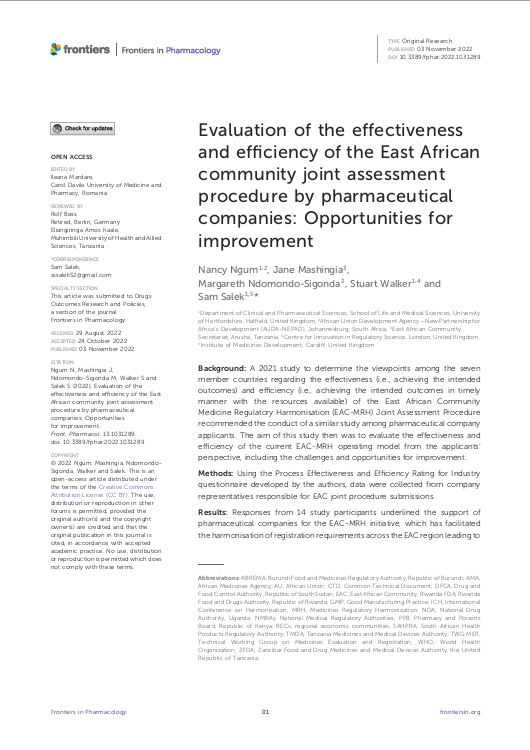Background: A 2021 study to determine the viewpoints among the seven member countries regarding the effectiveness (i.e., achieving the intended outcomes) and efficiency (i.e., achieving the intended outcomes in timely manner with the resources available) of the East African Community Medicine Regulatory Harmonisation (EAC-MRH) Joint Assessment Procedure recommended the conduct of a similar study among pharmaceutical company applicants. The aim of this study then was to evaluate the effectiveness and efficiency of the current EAC-MRH operating model from the applicants’ perspective, including the challenges and opportunities for improvement.
Methods: Using the Process Effectiveness and Efficiency Rating for Industry questionnaire developed by the authors, data were collected from company representatives responsible for EAC joint procedure submissions.
Results: Responses from 14 study participants underlined the support of pharmaceutical companies for the EAC-MRH initiative, which has facilitated the harmonisation of registration requirements across the EAC region leading to one registration for all countries and a reduction of the workload for both applicants and assessors. In addition, it is expected that shorter timelines for approval will lead to improved access to quality-assured essential medicines in the region. Access to various markets at the same time was also noted as an important benefit to pharmaceutical companies. Noted challenges include a lack of process information, a lack of centralised submission and tracking process and a lack of mandated central registration. A key strategy proposed by participants is the establishment of a regional administrative body to centrally receive and track EAC applications and the eventual establishment of a Regional EAC Medicines Authority.
Conclusion: This is the first study evaluating the performance of the EAC work-sharing initiative from the point of view of the applicants. In general, the applicants believe that the system performs efficiently and fulfils its promise. However, some participants indicated that in some countries an EAC positive recommendation does not directly result in an individual country approvals. Following the recommendations listed in this report may mitigate identified areas for improvement and facilitate the overall goal of the EAC-MRH initiative to expedite the availability of needed quality-assured medicines to patients in the region
Ngum N, Mashingia J, Ndomondo-Sigonda M, Walker S and Salek S (2022), Evaluation of the effectiveness and efficiency of the East African community joint assessment procedure by pharmaceutical companies: Opportunities for improvement. Front. Pharmacol. 13:1031289. doi: 10.3389/fphar.2022.1031289

